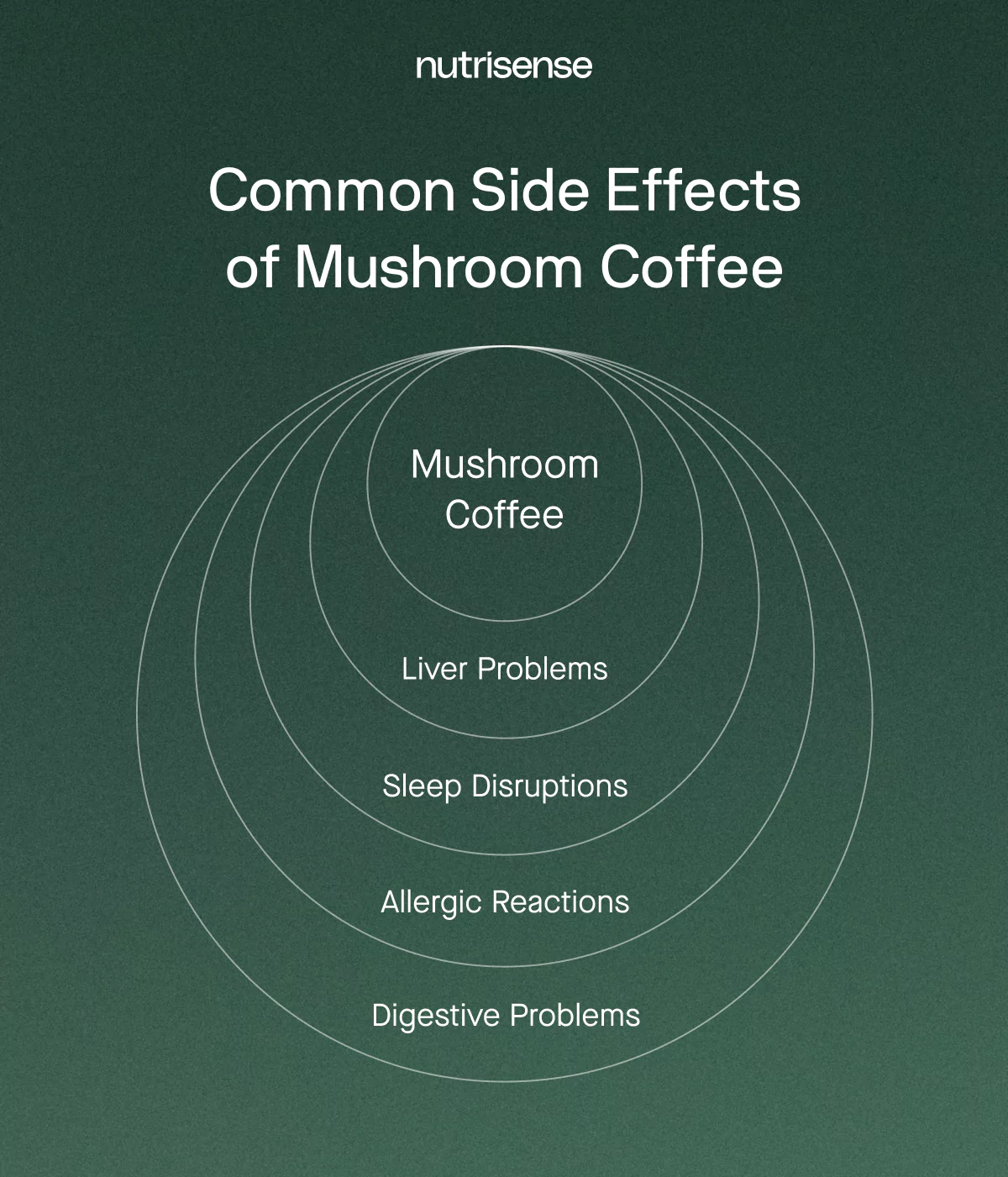What Is Mushroom Coffee and Is It Worth the Hype?

Key Takeaways
In recent years, you may have seen mushroom coffee taking over the internet. Proponents of the drink claim it blends the familiar comfort of your morning brew with the health-boosting properties of mushrooms.
But what exactly is mushroom coffee? Are these mushroom blends really considered a superfood—and does mushroom coffee live up to the hype? In this article, we'll explore the origins of mushroom coffee, its purported benefits, and whether it has any potential downsides.
What is Mushroom Coffee?

Mushroom coffee combines ground mushroom powder with traditional ground coffee, creating a drink that offers a distinct, earthy flavor profile and a potential array of health benefits. Common mushrooms used in these blends include mushroom varieties like:
- Chaga
- Lion's Mane
- Cordyceps
- Reishi,
Each type of mushroom is renowned for its unique properties. Chaga mushrooms, for example, is prized around the world for its antioxidant and antibacterial properties, while Lion's Mane is lauded for its potential cognitive benefits.
Cordyceps is known for its potential to enhance physical performance, and Reishi is celebrated for its adaptogenic properties, which may help the body adapt to stress.
Where Does Mushroom Coffee Come From?
The roots of mushroom coffee trace back to ancient cultures in Asia, where various forms of medicinal mushrooms have been revered for their health-enhancing properties for thousands of years.
Traditional Chinese medicine, for instance, extensively incorporated mushrooms into herbal remedies and tonics, valuing them for their adaptogenic qualities and potential to support energy levels and overall well-being.
This coffee alternative has gained attention in the U.S. over the years as interest in alternative health practices and functional foods has grown. Today, there are mushroom coffee brands such as Laird Superfood and Four Sigmatic readily available in health food stores, online retailers, and specialty coffee shops around the world.
The Potential Health Benefits of Mushroom Coffee

Beyond its interesting flavor profile and unique combination of ingredients, mushroom coffee is also believed to have a range of positive effects on both physical and mental well-being. Here are some of the potential health benefits of mushroom coffee:
- Better cognitive function
- Improved gut health
- Better immunity
- Improved stress modulation
- Blood sugar regulation
Now let’s have a look at exactly how mushroom coffee may be able to provide these benefits.
Better Cognitive Function
Certain mushrooms commonly used in mushroom coffee blends, notably Lion's Mane mushroom (Hericium erinaceus), have garnered attention for their potential to support brain function and health. This unique fungus contains erinacines and hericenones, which are bioactive compounds that have demonstrated neuroprotective properties in research.
These substances stimulate the production of nerve growth factor (NGF), a protein crucial for the growth, maintenance, and survival of neurons in the brain. Studies suggest that Lion's Mane may enhance cognitive functions such as memory and learning.
Improved Gut Health
Mushrooms, including those commonly used in mushroom coffee blends, possess prebiotic properties that can greatly benefit the digestive system. Prebiotics are non-digestible fibers and compounds that serve as nourishment for beneficial gut bacteria.
In mushrooms, the primary prebiotic component is beta-glucans, a type of polysaccharide found in their cell walls. Beta glucans promote the growth and activity of beneficial bacteria in the gut, which can lead to several positive effects on digestion and overall health.
Immune Support
Mushrooms harbor an array of properties that have been shown to fortify the immune system, largely because of their beta-glucan content. Prevalent in mushrooms like Reishi, Shiitake, and Maitake, beta glucans possess potent immune-modulating effects.
They stimulate immune cells, such as macrophages, prompting them to be responsive in detecting and combating foreign invaders like viruses and bacteria. Beta-glucans can also enhance the production of cytokines, signaling proteins that regulate immune responses.
Certain mushrooms such as Chaga are also rich in antioxidants—particularly melanin compounds—which help protect cells from oxidative damage caused by free radicals. By neutralizing harmful free radicals, these antioxidants may help reduce inflammation and support cellular health, ultimately reinforcing the immune system's resilience.
Stress Modulation
Adaptogenic mushrooms, like Reishi (Ganoderma lucidum), have gained recognition for their potential to assist the body in managing stress. Reishi mushrooms are rich in bioactive compounds, including triterpenes and polysaccharides, which possess adaptogenic properties.
Adaptogens are natural substances that help the body adapt to and cope with stressors, whether they be physical, emotional, or environmental in nature.
Blood Sugar Regulation
Certain mushrooms possess properties that can potentially influence insulin sensitivity and regulate glucose levels, making them potentially valuable in managing blood sugar levels. As mentioned earlier, varieties like Maitake and Shiitake contain beta-glucans, which have been shown to improve insulin sensitivity and reduce blood sugar by delaying stomach emptying, preventing rapid spikes in blood sugar levels after meals.
The Potential Health Concerns of Mushroom Coffee
While mushroom coffee seems to boast an array of promising benefits, it's also important to consider certain factors that may warrant caution or consideration for specific individuals. Here are some of the potential health considerations and side effects associated with this mushroom coffee:

Digestive Problems
For some, mushroom coffee may lead to mild stomach upset or other digestive discomfort. This can be attributed to the unique compounds found in certain mushrooms, which may not agree with everyone's digestive system.
Some people may experience stomach upset or other digestive discomfort when consuming mushroom coffee because of the higher FODMAP content found in certain mushrooms. FODMAPs are types of carbohydrates that can be difficult for some people to digest, potentially leading to symptoms like bloating, gas, and stomach cramps.
While not everyone is sensitive to FODMAPs, those with irritable bowel syndrome (IBS) or other digestive disorders may be more prone to experiencing discomfort after consuming these types of foods.
Sleep Disruption
The combination of caffeine and certain mushrooms in mushroom coffee can potentially influence sleep patterns. While mushrooms like Reishi are traditionally known for their calming effects, the caffeine content in coffee can counteract these properties.
This may lead to disrupted sleep patterns or difficulty falling asleep for some people, especially if consumed later in the day.
Allergic or Drug Reactions

People with allergies or sensitivities should be aware of the potential for allergic reactions when consuming mushroom coffee. While rare, allergic reactions to mushrooms can occur, particularly in those with existing sensitivities to fungi. If you have known allergies or sensitivities to mushrooms, exercise caution and consult a healthcare professional before incorporating mushroom coffee into your diet.
People taking medications should also be aware of potential interactions with the compounds in mushrooms. Some mushrooms, especially those with medicinal properties, may interact with specific medications, affecting their efficacy.
Liver Concerns
Certain types of mushrooms, though rare, may also have the potential to cause hepatotoxic effects, meaning they can be harmful to the liver. While these toxic varieties are not typically used in mushroom coffee blends, it is crucial to be aware of the potential risks associated with wild mushroom consumption.
With this in mind, when choosing to drink mushroom coffee, it is incredibly important to be knowledgeable about the sourcing and types of mushrooms used in the blend. Reputable manufacturers will clearly label the specific mushroom varieties in their products.
Mushroom Coffee vs. Regular Coffee: Which is Best?

Now that we've explored the potential benefits and considerations surrounding mushroom coffee, how does it actually compare to the tried-and-true favorite, arabica coffee?
Before we dive in, it’s important to understand that the effects of both coffee and mushrooms require a nuanced consideration of dosage. Both of these natural sources contain an array of bioactive compounds, and their impact on the body is directly tied to the quantity consumed.
This is a principle known as dose-dependency: at low doses, these compounds may offer stimulation, while at high doses, they can lead to inhibition. With this in mind, there's no one-size-fits-all answer when it comes to choosing between mushroom coffee and regular coffee.
Each individual's unique tolerance and response to different dosages play a role in determining which brew aligns best with their preferences and well-being.
Ingredients and Preparation
Regular coffee is made by brewing roasted coffee beans. The process typically involves grinding the beans to a desired consistency, then adding them to hot water. The mixture steeps before the grounds are separated from the water, allowing the water to extract flavors, oils, and caffeine from the grounds.
Mushroom coffee is made by blending ground mushroom extracts or powders with traditional coffee grounds or brewed coffee. To make it, finely ground mushrooms are mixed with coffee or brewed alongside it. This combination results in a unique brew that retains the familiar flavor of coffee while incorporating the potential health benefits of the mushrooms.
Just like regular coffee, you can add milk or creamer and create a mushroom coffee latte or cappuccino.
Taste and Texture

Mushrooms add an earthy, nutty undertone to traditional coffee. Depending on the specific mushroom blend, you might notice that this coffee tastes woody, herbal, or even slightly sweet. This unique combination offers a more complex and layered taste experience, adding depth to the overall flavor profile.
In terms of texture, the addition of finely ground mushroom extracts or powders may add a subtle graininess or thickness to the brew. Because the mushrooms are typically processed to be easily dissolved, these textural differences are usually subtle and shouldn’t drastically affect the overall experience.
Caffeine Levels
Because mushrooms don’t contain caffeine, mushroom coffee generally contains less caffeine than regular coffee. Here’s an estimate of the caffeine content found in regular coffee versus mushroom coffee—though keep in mind that this can vary depending on the specific blend and brand.
- A regular cup of coffee: 80 to 100 milligrams of caffeine per eight ounce serving
- A cup of mushroom coffee: Around 40 milligrams per eight ounce serving
For people who are sensitive to caffeine or those looking to reduce their caffeine intake, mushroom coffee can offer a milder alternative that still provides a slight energy boost.
Find the right Nutrisense programto turn insight into progress.
Go Beyond Glucose Data with Nutrisense
Your glucose can significantly impact how your body feels and functions. That’s why stable levels are an important factor in supporting overall wellbeing. But viewing glucose isn't enough. Nutrisense, you’ll be able to learn how to use your body's data to make informed lifestyle choices that support healthy living.
One-to-one coaching
Sign up to access insurance-covered video calls to work with a glucose expert: a personal registered dietitian or certified nutritionist who will help tailor your lifestyle and diet to your goals.
Monitor and measure what matters
With the Nutrisense CGM Program, you can monitor your glucose with health tech like glucose biosensors and continuous glucose monitor (CGM)s, and analyze the trends over time with the Nutrisense App. This will help you make the most informed choices about the foods you consume and their impact on your health.
Find your best fit
Ready to take the first step? Start with our quiz to find the right Nutrisense program to help you take control.

Jordyn has a bachelor’s degree in biology, a graduate degree in Human Nutrition and completed a dietetic internship at the Memphis VA. She's a dietitian at Nutrisense, and has experience working as a clinical dietitian at a VA medical center specializing in oncology and at the Mayo Clinic, working with a wide range of patients ranging from neonates in the NICU to adult ICU.




